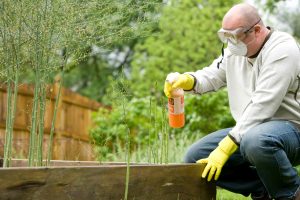 The best way to deal with weeds, especially when they’re in your lawn, is to have such a healthy lawn they have no chance of growing. If your soil is compacted, grass cut too short, improperly watered with too much or too little, or it’s in nutrient-deprived soil, the chances of weeds getting a foothold are great. You don’t always have that opportunity. That’s when you turn to weed control methods, both natural and chemical. Which is the best to use? It all depends on your beliefs, situation, and the type of weed and level of infestation.
The best way to deal with weeds, especially when they’re in your lawn, is to have such a healthy lawn they have no chance of growing. If your soil is compacted, grass cut too short, improperly watered with too much or too little, or it’s in nutrient-deprived soil, the chances of weeds getting a foothold are great. You don’t always have that opportunity. That’s when you turn to weed control methods, both natural and chemical. Which is the best to use? It all depends on your beliefs, situation, and the type of weed and level of infestation.
Prepare the soil properly to avoid weeds in gardens or around plants or trees.
Cover the area with landscape fabric. Make sure you secure the edges well. You can cover it with stone or mulch. Stone is best as mulch breaks down. Landscape fabric allows water to soak through and prevents weeds from growing in the covered areas. Another method is to use a decorative ground cover that remains evergreen to choke out weeds or put in plants with wider bottoms to shade the area and starve the weeds of sunshine.
Good practices prevent weeds in the lawn.
If your soil is compact, aerate it to allow the grass to get a healthy start. Overseed on bare spots to crowd out weeds and prevent them from getting established. Don’t cut your lawn too short. Letting grass grow to its higher recommended height keeps the soil shaded and prevents weeds from getting sun. When you water your grass, it’s better to do it less frequently and deeper. It causes deep root growth that makes it more competitive for nutrients.
When should you use natural methods or chemical ones?
If you have a serious weed problem or are trying to rescue a neglected lawn, you may need to resort to chemicals. Pre-emergent weed killer prevents weed seed germination. Post-emergent herbicides kill weeds that have sprouted. Some natural solutions include pulling weeds by hand and pouring hot water or vinegar on the weed. The last two will also kill any landscaping or garden plants. You may also use baking soda. It raises the salinity of the soil. It’s also best used in small amounts and with discretion on weeds in sidewalk cracks and where there aren’t other plants.
- Knowing the type of weed you’re dealing with makes a difference. If you’re using commercial herbicides, get the right type. Use ones that selectively kill the troublesome weeds but don’t harm nearby plants.
- The best way to control weeds is always by promoting desirable plants. Make the growing area as conducive as possible to the plants used for landscaping or your grass.
- Knowing the best time to use weed killer is as important as the type of weed killer you use. You can use broadleaf weed killer on grass without harming the grass unless you’ve recently planted it. You’ve not provided enough time to get established.
- We can help you with your weed problems. Our best practices will reduce the need for chemicals and keep your landscape beautiful and weed-free.
For more information, contact us today at Mason Prociw Landscape
